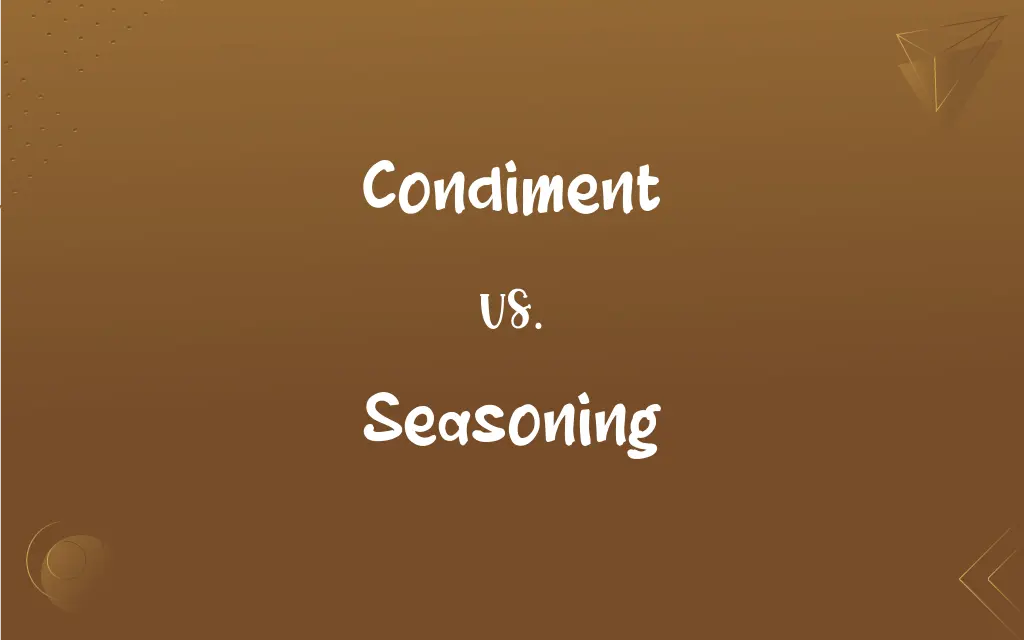Condiment vs. Seasoning: What's the Difference?
Edited by Aimie Carlson || By Harlon Moss || Updated on November 30, 2023
Condiments are sauces or preparations added to food after cooking for flavor, while seasonings are ingredients added during cooking to enhance taste.

Key Differences
Condiments are typically used as add-ons after a dish is prepared, enhancing or complementing the food's flavor. Seasonings, on the other hand, are incorporated during the cooking process to infuse the food with flavor. Both play crucial roles in culinary arts, yet their application and timing distinguish them.
Condiments are often liquid or semi-liquid substances like ketchup or mustard, while seasonings encompass a broader range, including herbs, spices, and salt. The condiment's role is to add an extra layer of flavor, whereas seasoning's purpose is to enhance the existing flavors of the dish.
In terms of usage, condiments are generally optional and subject to individual preference. Seasonings, however, are usually integral to the recipe, contributing to the dish's fundamental taste profile. Both elements offer versatility but serve different purposes in food preparation and consumption.
The diversity among condiments is vast, spanning various cultures and cuisines, from salsa to soy sauce. Seasonings, while equally diverse, are more universally applied across different cuisines, with common examples like pepper or garlic powder. Both categories contribute significantly to culinary diversity.
The choice of condiments often reflects personal taste and cultural backgrounds, while seasonings tend to align more with the nature of the dish being prepared. Though different in their usage, both condiments and seasonings are indispensable in enhancing the dining experience.
ADVERTISEMENT
Comparison Chart
Form
Usually liquid or semi-liquid
Mostly dry herbs, spices, or salts
Timing of Use
Added after cooking
Added during cooking
Role
Enhances or complements main flavors
Integrally enhances food's flavor
Variability
Subject to personal taste
Generally recipe-specific
Cultural Reflection
Reflects cultural preferences
More universal across different cuisines
ADVERTISEMENT
Condiment and Seasoning Definitions
Condiment
A substance added to food to enhance its flavor, usually after cooking.
Ketchup is a popular condiment for fries.
Seasoning
Any of various condiments or spices added to food to impart flavor.
Rosemary is a popular seasoning for roasted potatoes.
Condiment
Any sauce or preparation used as an accompaniment to food.
Mustard is a classic condiment for hot dogs.
Seasoning
A substance added during cooking to enhance the natural flavors of food.
Salt is a basic seasoning used in nearly every savory dish.
Condiment
A non-essential food additive used to season or flavor a dish.
Soy sauce is a common condiment in Asian cuisine.
Seasoning
An ingredient, usually a herb or spice, used to flavor food while it is being cooked.
Garlic powder is a versatile seasoning used in numerous dishes.
Condiment
A spice, sauce, or preparation that is added to food, post-preparation, to impart a specific flavor.
Mayonnaise is often used as a condiment in sandwiches.
Seasoning
Any herb, spice, or salt used to enrich the flavor of food during its cooking process.
Pepper is added as a seasoning to enhance the taste of soups.
Condiment
Any extra ingredient, usually liquid, used to enhance the taste of a meal.
Salsa is a flavorful condiment for tortilla chips.
Seasoning
A mix of ground spices used to enhance the taste of food during its preparation.
Curry powder is a key seasoning in Indian cuisine.
Condiment
A substance, such as a relish, vinegar, or spice, used to flavor or complement food.
Seasoning
Something, such as a spice or herb, used to flavor food. Also called seasoner.
Condiment
Something used to enhance the flavor of food; for example, salt or pepper.
Seasoning
The act or process by which something is seasoned.
Condiment
(transitive) To season with condiments.
Condiment
(transitive) To pickle.
Condiment
Something used to give relish to food, and to gratify the taste; a pungment and appetizing substance, as pepper or mustard; seasoning.
As for radish and the like, they are for condiments, and not for nourishment.
Condiment
A preparation (a sauce or relish or spice) to enhance flavor or enjoyment;
Mustard and ketchup are condiments
FAQs
Are condiments necessary for a dish?
Condiments are not necessary but are used based on individual preference to add extra flavor.
What is seasoning?
Seasoning is any ingredient, typically a spice or herb, added during cooking to enhance the food's flavor.
Can a condiment be a seasoning?
Generally, no. Condiments are used post-cooking, while seasonings are used during cooking.
Are pickles considered a condiment?
Yes, pickles are often used as a condiment to complement various dishes.
Is salt a condiment or a seasoning?
Salt is typically considered a seasoning, as it's used during cooking to enhance flavor.
Do all cuisines use seasonings?
Yes, nearly all cuisines use some form of seasoning to flavor their dishes.
Is sugar a condiment or seasoning?
Sugar can act as a seasoning when used during cooking, especially in savory dishes.
Can seasonings change the color of a dish?
Yes, some seasonings, like paprika, can add color to dishes.
What's the most commonly used seasoning?
Salt is the most universally used seasoning in cooking.
What is a condiment?
A condiment is a sauce or preparation added to food after cooking to enhance its flavor.
Do seasonings lose flavor over time?
Yes, seasonings can lose their potency over time and should be stored properly.
Can a dish have both condiments and seasonings?
Yes, many dishes use both, with seasonings added during cooking and condiments served alongside.
Are herbs always considered seasonings?
Generally, herbs are used as seasonings when added during cooking.
Are there any health concerns with condiments?
Some condiments can be high in sugar, salt, or additives, so moderation is key.
Is vinegar a condiment?
Yes, vinegar is often used as a condiment, especially in dressings and marinades.
Is butter a condiment or seasoning?
Butter is typically considered neither; it's used as a cooking fat or spread.
Can I use condiments in cooking?
While atypical, some condiments can be used in cooking for flavor.
Can condiments be homemade?
Yes, many condiments like sauces and relishes can be made at home.
Do condiments have a long shelf life?
Many condiments, especially store-bought ones, have preservatives that extend their shelf life.
Are all seasonings spicy?
No, seasonings vary greatly in flavor, and not all are spicy.
About Author
Written by
Harlon MossHarlon is a seasoned quality moderator and accomplished content writer for Difference Wiki. An alumnus of the prestigious University of California, he earned his degree in Computer Science. Leveraging his academic background, Harlon brings a meticulous and informed perspective to his work, ensuring content accuracy and excellence.
Edited by
Aimie CarlsonAimie Carlson, holding a master's degree in English literature, is a fervent English language enthusiast. She lends her writing talents to Difference Wiki, a prominent website that specializes in comparisons, offering readers insightful analyses that both captivate and inform.
































































